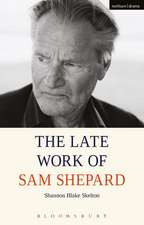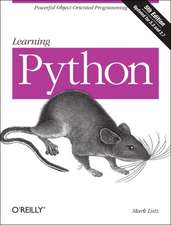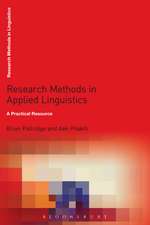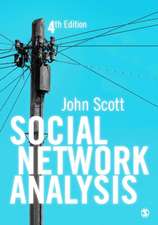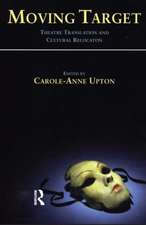Argumentation: Analysis and Evaluation
Autor Frans H. Van Eemeren, A. Francisca Sn Henkemansen Limba Engleză Paperback – 15 noi 2016
The authors begin their treatment of argumentation theory at the same juncture where argumentation also starts in practice: The difference of opinion that occasions the evolvement of the argumentation. Each chapter begins with a short summary of the essentials and ends with a number of exercises that students can use to master the material. Argumentation is the first introductory textbook of this kind. It is intended as a general introduction for students who are interested in a proper conduct of argumentative discourse. Suggestions for further reading are made for each topic and several extra assignments are added to the exercises.
Special features:
• A concise and complete treatment of both the theoretical backgrounds and the practice of argumentation analysis and evaluation.
• Crucial concepts from pragmatics (speech act theory, Grice’s cooperative principle) presented in a non-technical way; introducing the theory of verbal communication.
• The first textbook treatment of strategic maneuvering as a way of balancing being reasonable with being effective
• Exercises and assignments based on real-life texts from a variety of contexts.
| Toate formatele și edițiile | Preț | Express |
|---|---|---|
| Paperback (1) | 384.96 lei 3-5 săpt. | +16.01 lei 10-14 zile |
| Taylor & Francis – 15 noi 2016 | 384.96 lei 3-5 săpt. | +16.01 lei 10-14 zile |
| Hardback (1) | 1219.72 lei 6-8 săpt. | |
| Taylor & Francis – 6 dec 2016 | 1219.72 lei 6-8 săpt. |
Preț: 384.96 lei
Nou
Puncte Express: 577
Preț estimativ în valută:
73.67€ • 76.63$ • 60.82£
73.67€ • 76.63$ • 60.82£
Carte disponibilă
Livrare economică 22 martie-05 aprilie
Livrare express 11-15 martie pentru 26.00 lei
Preluare comenzi: 021 569.72.76
Specificații
ISBN-13: 9781138225084
ISBN-10: 1138225088
Pagini: 184
Dimensiuni: 152 x 229 x 10 mm
Greutate: 0.28 kg
Ediția:2 ed
Editura: Taylor & Francis
Colecția Routledge
Locul publicării:Oxford, United Kingdom
ISBN-10: 1138225088
Pagini: 184
Dimensiuni: 152 x 229 x 10 mm
Greutate: 0.28 kg
Ediția:2 ed
Editura: Taylor & Francis
Colecția Routledge
Locul publicării:Oxford, United Kingdom
Public țintă
ProfessionalCuprins
Preface
1 Standpoints and differences of opinion
Essentials
1.1 Discussion and disagreement
1.2 Explicit and implicit differences of opinion
1.3 Positive and negative standpoints
1.4 Standpoints and expressions of doubt
1.5 Types of differences of opinion
1.6 Main differences of opinion and subordinate differences of opinion
1.7 The presentation of standpoints and doubt
Further reading
Exercises
Special assignment 1
2 Argumentation and discussion
Essentials
2.1 Resolving a difference of opinion
2.2 Argumentative discourse and having a critical discussion
2.3 The ideal model of a critical discussion
2.4 Argumentation in a critical discussion
Further reading
Exercises
3 The presentation of argumentation
Essentials
3.1 Identifying the standpoint
3.2 Indicators of argumentation
3.3 Clues in the context
3.4 Additional means of identifying argumentation
3.5 Explanation, elaboration and clarification
3.6 A maximally argumentative interpretation
Further reading
Exercises
4 Unexpressed standpoints and unexpressed premises
Essentials
4.1 Unexpressed elements in argumentative discourse
4.2 Indirectness and the rules for communication
4.3 Correctness conditions for speech acts
4.4 Violations of the communication rules
4.5 Variants of indirectness
4.6 Making unexpressed standpoints explicit
4.7 Making unexpressed premises explicit
4.8 Unexpressed premises in a well-defined context
Further reading
Exercises
5 The argumentation structure
Essentials
5.1 Single arguments
5.2 Combinations of single arguments
5.3 Multiple, coordinative, and subordinative argumentation
5.4 Representing the argumentation structure schematically
5.5 The presentation of complex argumentation
5.6 A maximally argumentative analysis
5.7 Unexpressed premises and complex argumentation
5.8 Composing an analytic overview
Further reading
Exercises
Special assignments 2, 3, 4, 5
6 The soundness of argumentation
Essentials
6.1 Evaluating argumentative discourse
6.2 The acceptability of argumentative statements
6.3 The validity of the reasoning
6.4 The soundness of argument schemes
6.5 Argumentation based on a symptomatic relation
6.6 Argumentation based on a relation of analogy
6.7 Argumentation based on a causal relation
6.8 The presentation of different types of argumentation
Further reading
Exercises
7 Fallacies as violations of discussion rules 1-5
Essentials
7.1 Fallacies and discussion rules
7.2 Violations of the freedom rule
7.3 Violations of the burden-of-proof rule
7.4 Violations of the standpoint rule
7.5 Violations of the relevance rule
7.6 Violations of the unexpressed premise rule
Further reading
Exercises
8 Fallacies as violations of discussion rules 6-10
Essentials
8.1 The conclusive defense of standpoints
8.2 Violations of the starting point rule
8.3 Violations of the validity rule
8.4 Violations of the argument scheme rule
8.5 Violations of the closure rule
8.6 Violations of the usage rule
Further reading
Exercises
Special assignment 6
9 Strategic manoeuvring
Essentials
9.1 Reconciling reasonableness and effectiveness
9.2 Three aspects of strategic manoeuvring
9.3 Rhetorical analogues of dialectical aims
9.4 Various kinds of argumentative strategies
9.5 Fallacies as derailments of strategic manoeuvring
9.6 The treacherous character of fallacious strategic manoeuvring
Further reading
Exercises
Special assignment 7
10 The conventionalization of communicative activity types
Essentials
10.1 Communicative activity types
10.2 Argumentative characterization of communicative activity types
10.3 Institutional preconditions for strategic manoeuvring
10.4 Different implementations of critical questions
Further reading
Exercises
Special assignment 8
Overview of rules for critical discussion and fallacies
General references
1 Standpoints and differences of opinion
Essentials
1.1 Discussion and disagreement
1.2 Explicit and implicit differences of opinion
1.3 Positive and negative standpoints
1.4 Standpoints and expressions of doubt
1.5 Types of differences of opinion
1.6 Main differences of opinion and subordinate differences of opinion
1.7 The presentation of standpoints and doubt
Further reading
Exercises
Special assignment 1
2 Argumentation and discussion
Essentials
2.1 Resolving a difference of opinion
2.2 Argumentative discourse and having a critical discussion
2.3 The ideal model of a critical discussion
2.4 Argumentation in a critical discussion
Further reading
Exercises
3 The presentation of argumentation
Essentials
3.1 Identifying the standpoint
3.2 Indicators of argumentation
3.3 Clues in the context
3.4 Additional means of identifying argumentation
3.5 Explanation, elaboration and clarification
3.6 A maximally argumentative interpretation
Further reading
Exercises
4 Unexpressed standpoints and unexpressed premises
Essentials
4.1 Unexpressed elements in argumentative discourse
4.2 Indirectness and the rules for communication
4.3 Correctness conditions for speech acts
4.4 Violations of the communication rules
4.5 Variants of indirectness
4.6 Making unexpressed standpoints explicit
4.7 Making unexpressed premises explicit
4.8 Unexpressed premises in a well-defined context
Further reading
Exercises
5 The argumentation structure
Essentials
5.1 Single arguments
5.2 Combinations of single arguments
5.3 Multiple, coordinative, and subordinative argumentation
5.4 Representing the argumentation structure schematically
5.5 The presentation of complex argumentation
5.6 A maximally argumentative analysis
5.7 Unexpressed premises and complex argumentation
5.8 Composing an analytic overview
Further reading
Exercises
Special assignments 2, 3, 4, 5
6 The soundness of argumentation
Essentials
6.1 Evaluating argumentative discourse
6.2 The acceptability of argumentative statements
6.3 The validity of the reasoning
6.4 The soundness of argument schemes
6.5 Argumentation based on a symptomatic relation
6.6 Argumentation based on a relation of analogy
6.7 Argumentation based on a causal relation
6.8 The presentation of different types of argumentation
Further reading
Exercises
7 Fallacies as violations of discussion rules 1-5
Essentials
7.1 Fallacies and discussion rules
7.2 Violations of the freedom rule
7.3 Violations of the burden-of-proof rule
7.4 Violations of the standpoint rule
7.5 Violations of the relevance rule
7.6 Violations of the unexpressed premise rule
Further reading
Exercises
8 Fallacies as violations of discussion rules 6-10
Essentials
8.1 The conclusive defense of standpoints
8.2 Violations of the starting point rule
8.3 Violations of the validity rule
8.4 Violations of the argument scheme rule
8.5 Violations of the closure rule
8.6 Violations of the usage rule
Further reading
Exercises
Special assignment 6
9 Strategic manoeuvring
Essentials
9.1 Reconciling reasonableness and effectiveness
9.2 Three aspects of strategic manoeuvring
9.3 Rhetorical analogues of dialectical aims
9.4 Various kinds of argumentative strategies
9.5 Fallacies as derailments of strategic manoeuvring
9.6 The treacherous character of fallacious strategic manoeuvring
Further reading
Exercises
Special assignment 7
10 The conventionalization of communicative activity types
Essentials
10.1 Communicative activity types
10.2 Argumentative characterization of communicative activity types
10.3 Institutional preconditions for strategic manoeuvring
10.4 Different implementations of critical questions
Further reading
Exercises
Special assignment 8
Overview of rules for critical discussion and fallacies
General references
Notă biografică
A. Francisca Sn Henkemans
Frans H. van Eemeren
Frans H. van Eemeren
Descriere
This book concentrates on argumentation as it emerges in ordinary discourse, whether the discourse is institutionalized or strictly informal. Crucial concepts from the theory of argumentation are systematically discussed and explained with the help of examples from real-life discourse and texts. The basic principles are explained that are instrumental in the analysis and evaluation of argumentative discourse. Methodical instruments are offered for identifying differences of opinion, analyzing and evaluating argumentation and presenting arguments in oral and written discourse. Attention is also paid to the way in which arguers attempt to be not just reasonable, but effective as well, by maneuvering strategically. In addition, the book provides a great variety of exercises and assignments to improve the student’s skill in presenting argumentation.















